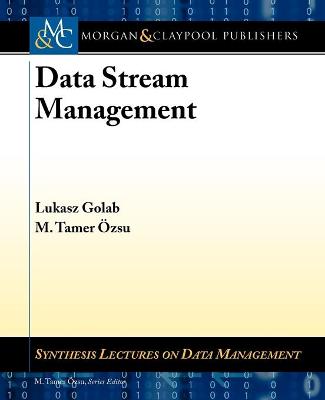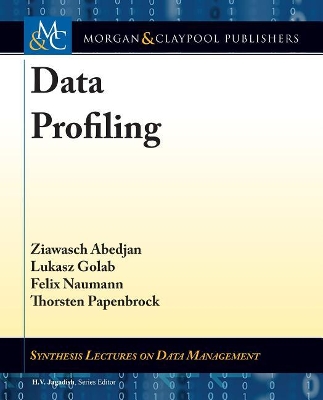Synthesis Lectures on Data Management
3 total works
Many applications process high volumes of streaming data, among them Internet traffic analysis, financial tickers, and transaction log mining. In general, a data stream is an unbounded data set that is produced incrementally over time, rather than being available in full before its processing begins.
In this lecture, we give an overview of recent research in stream processing, ranging from answering simple queries on high-speed streams to loading real-time data feeds into a streaming warehouse for off-line analysis.
We will discuss two types of systems for end-to-end stream processing: Data Stream Management Systems (DSMSs) and Streaming Data Warehouses (SDWs). A traditional database management system typically processes a stream of ad-hoc queries over relatively static data. In contrast, a DSMS evaluates static (long-running) queries on streaming data, making a single pass over the data and using limited working memory. In the first part of this lecture, we will discuss research problems in DSMSs, such as continuous query languages, non-blocking query operators that continually react to new data, and continuous query optimization. The second part covers SDWs, which combine the real-time response of a DSMS by loading new data as soon as they arrive with a data warehouse's ability to manage Terabytes of historical data on secondary storage.
In this lecture, we give an overview of recent research in stream processing, ranging from answering simple queries on high-speed streams to loading real-time data feeds into a streaming warehouse for off-line analysis.
We will discuss two types of systems for end-to-end stream processing: Data Stream Management Systems (DSMSs) and Streaming Data Warehouses (SDWs). A traditional database management system typically processes a stream of ad-hoc queries over relatively static data. In contrast, a DSMS evaluates static (long-running) queries on streaming data, making a single pass over the data and using limited working memory. In the first part of this lecture, we will discuss research problems in DSMSs, such as continuous query languages, non-blocking query operators that continually react to new data, and continuous query optimization. The second part covers SDWs, which combine the real-time response of a DSMS by loading new data as soon as they arrive with a data warehouse's ability to manage Terabytes of historical data on secondary storage.
Data Profiling
by Ziawasch Abedjan, Lukasz Golab, Felix Naumann, and Thorsten Papenbrock
Published 8 November 2018
Data profiling refers to the activity of collecting data about data, i.e., metadata. Most IT professionals and researchers who work with data have engaged in data profiling, at least informally, to understand and explore an unfamiliar dataset or to determine whether a new dataset is appropriate for a particular task at hand. Data profiling results are also important in a variety of other situations, including query optimization, data integration, and data cleaning. Simple metadata are statistics, such as the number of rows and columns, schema and datatype information, the number of distinct values, statistical value distributions, and the number of null or empty values in each column. More complex types of metadata are statements about multiple columns and their correlation, such as candidate keys, functional dependencies, and other types of dependencies.
This book provides a classification of the various types of profilable metadata, discusses popular data profiling tasks, and surveys state-of-the-art profiling algorithms. While most of the book focuses on tasks and algorithms for relational data profiling, we also briefly discuss systems and techniques for profiling non-relational data such as graphs and text. We conclude with a discussion of data profiling challenges and directions for future work in this area.
This book provides a classification of the various types of profilable metadata, discusses popular data profiling tasks, and surveys state-of-the-art profiling algorithms. While most of the book focuses on tasks and algorithms for relational data profiling, we also briefly discuss systems and techniques for profiling non-relational data such as graphs and text. We conclude with a discussion of data profiling challenges and directions for future work in this area.
Data Stream Management, Second Edition
by Lukasz Golab, Nesime Tatbul, and M. Tamer Ozsu
Published 1 October 2013


